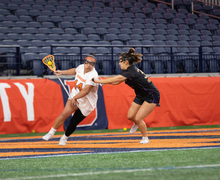Jennifer Gunsuallus talks hook-up culture at ‘I Am Enough’ lecture
Stacy Fernandez | Staff Writer
Jennifer Gunsaullus presented “Women and Hook-Up Culture: Risky, Slutty, or Liberated?” inside Goldstein Auditorium on Wednesday evening.
Jennifer Gunsaullus said empowerment is being able to make a choice when you previously weren’t able to.
Gunsaullus, a sociologist, sexologist and frequent speaker about sex and health, presented a lecture titled “Women and Hook-Up Culture: Risky, Slutty, or Liberated?” on Wednesday evening in Goldstein Auditorium. The Syracuse University Panhellenic sororities came together for the lecture, which is a part of the “I Am Enough” week of empowerment.
The entire bottom floor of the auditorium was filled for the lecture, which focused on the idea of hook-up culture.
Gunsaullus defined hooking up as sexual activity with someone who is not a regular committed partner — in other words, casual sex for the sake of sexual pleasure and physically connecting with somebody else.
Gunsaullus added that part of the risk of sex is a lack of communication and the difficulty of understanding what consent really is.
“Consent is presented as something easy … unless we have ongoing verbal dialogues about our likes, dislikes and expectations and what we want to do and don’t want to do, us and our partner are making tons of assumptions,” Gunsaullus said.
As a sociologist, Gunsaullus said she has read a lot of the research about hook-up culture, particularly in the past 15-20 years. She said she has seen a lot of headlines implying that hook-up culture is not only a bad thing, but a new thing.
But those headlines are not shown to be based in fact or statistics, said Gunsaullus, who pointed to research comparing 18 to 25-year-olds of the 1980s and ’90s to current college students. The number of sexual partners college students have has not changed significantly since then, she added.
Gunsaullus said sociologist Stephanie Coontz summarizes it best: “Hookups may seem shocking to an older generation unaccustomed to such frankness, but this generation did not invent casual sex or one-night stands.”
She highlighted three perspectives that tend to show up in how headlines talk about hooking up and how research is conducted on hook-up culture at colleges: it’s risky, it’s slutty or it’s liberating, she said.
Gunsaullus went more in-depth on each topic and accompanied the lecture with a slideshow with pictures that often got laughs from the crowd.
In the section about risk, Gunsaullus mainly spoke about the way that hook-ups are related to binge drinking. She said research has shown about 50 percent of hook-ups involve binge drinking.
On the topic of being slutty, Gunsaullus said it is ironic that women are highly sexualized and desired for their sexuality, but criticized when they want to be in control of their sexuality. Gunsaullus urged the crowd to be sexual under their own terms.
The liberation topic of Gunsaullus’s lecture focused mainly on how women feel sexually and why they have sex. She cited a 2007 study by the University of Texas at Austin that found there are 237 reasons why people have sex. These reasons fall under four categories: physical, emotional, goals and insecurity. She added that it is important that women have sex for the reasons that feel right to them.
Toward the end of the lecture, Gunsaullus highlighted the importance of sexual empowerment and learning to take back your power even if it makes you vulnerable.
“The more vulnerable we are, the more authentic we are, and the more vulnerable and authentic and mindful we are … the happier we are in life,” Gunsaullus said.
As the lecture ended, the crowd collectively began to yell, “I am enough,” with Gunsaullus joining in.
Published on February 25, 2016 at 12:17 am
Contact Stacy: sfern100@syr.edu | @StacyFernandezB





